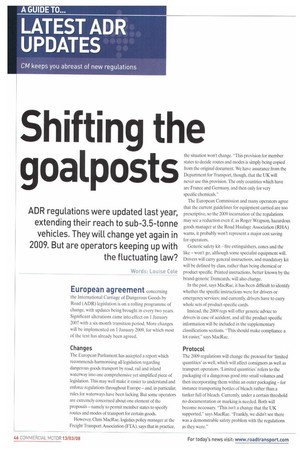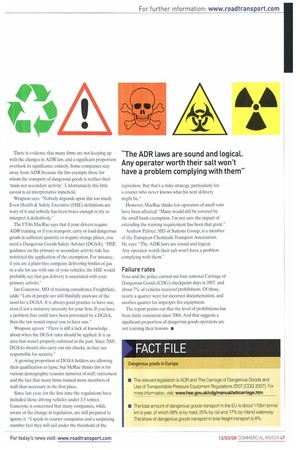Shifting the goalposts
Page 46

Page 47

If you've noticed an error in this article please click here to report it so we can fix it.
ADR regulations were updated last year, extending their reach to sub-3.5-tonne vehicles. They will change yet again in 2009. But are operators keeping up with the fluctuating law?
Words: Louise Cote European agreement concerning the International Carriage of Dangerous Goods by Road (ADR) legislation is on a rolling programme of change, with updates being brought in every two years. Significant alterations came into effect on 1 January 2007 with a six-month transition period. More changes will be implemented on I January 2009, for which most of the text has already been agreed.
Changes
The European Parliament has accepted a report which recommends harmonising all legislation regarding dangerous goods transport by road, rail and inland waterway into one comprehensive yet simplified piece of legislation. This may well make it easier to understand and enforce regulations throughout Europe — and, in particular, rules for waterways have been lacking. But some operators are extremely concerned about one element of the proposals — namely to permit member states to specify routes and modes of transport for certain goods.
However, Chris MacRae, logistics policy manager at the Freight Transport Association (FTA). says that in practice, the situation won't change. "This provision for member states to decide routes and modes is simply being copied from the original document. We have assurance from the Department for Transport, though, that the UK will never use this provision. The only countries which have are France and Germany, and then only for very specific chemicals."
The European Commission and many operators agree that the current guidelines for equipment carried are too prescriptive, so the 2009 incarnation of the regulations may see a reduction even if, as Roger Wrapson, hazardous goods manager at the Road Haulage Association (RHA) warns, it probably won't represent a major cost saving for operators.
Generic safety kit — fire extinguishers, cones and the like — won't go, although some specialist equipment will. Drivers will carry general instructions, and mandatory kit will be defined by class, rather than being chemical or product specific. Printed instructions, better known by the brand-generic Tremcards, will also change.
In the past, says MacRae, it has been difficult to identify whether the specific instructions were for drivers or emergency services; and currently, drivers have to carry whole sets of product-specific cards.
Instead, the 2009 regs will offer generic advice to drivers in case of accident, and all the product-specific information will be included in the supplementary classifications sections. "This should make compliance a lot easier," says MacRae.
Protocol
The 2009 regulations will change the protocol for 'limited quantities' as well, which will affect consignors as well as transport operators. 'Limited quantities' refers to the packaging of a dangerous good into small volumes and then incorporating them within an outer packaging — for instance transporting bottles of bleach rather than a tanker full of bleach. Currently, under a certain threshold no documentation or marking is needed. Both will become necessary. "This isn't a change that the UK supported," says MacRae. "Frankly, we didn't see there was a demonstrable safety problem with the regulations as they were." There is evidence that many firms are not keeping up with the changes in ADR law, and a significant proportion overlook its significance entirely. Some companies stay away from ADR because the law exempts those for whom the transport of dangerous goods is neither their 'main nor secondary activity'. Unfortunately this little caveat is an interpretative minefield.
Wrapson says: "Nobody depends upon this too much. Even Health & Safety Executive (HSE) definitions arc wary of it and nobody has been brave enough to try to interpret it definitively."
The FTA's MacRae says that if your drivers require ADR training, or if you transport, carry or load dangerous goods in sufficient quantity to require orange plates, you need a Dangerous Goods Safety Adviser (DGSA). "HSE guidance on the primary or secondary activity rule has restricted the application of the exemption. For instance, if you are a plant-hire company delivering bottles of gas to a site for use with one of your vehicles, the HSE would probably say that gas delivery is associated with your primary activity."
Ian Gascoyne, MD of training consultancy FreightSafe, adds: "Lots of people are still blissfully unaware of the need for a DGSA. It is always good practice to have one, even if not a statutory necessity for your firm. If you have a problem that could have been prevented by a DGSA, then the law would expect you to have one."
Wrapson agrees: "There is still a lack of knowledge about when the DGSA rules should be applied. It is an area that wasn't properly enforced in the past. Since 2005, DGSAs should also carry out site checks, as they are responsible for security."
A growing proportion of DGSA holders are allowing their qualification to lapse, but McRae thinks this is for various demographic reasons: turnover of staff, retirement and the fact that many firms trained more members of staff than necessary in the first place.
Since last year, for the first time the regulations have included those driving vehicles under 3.5 tonnes. Gascoyne is concerned that many companies, while aware of the change in legislation, are still prepared to ignore it. "I speak to courier companies and a surprising number feel they will sail under the threshold of the legislation. But that's a risky strategy, particularly for a courier who never knows what his next delivery might he."
However, MacRae thinks few operators of small vans have been affected: "Many would still be covered by the small loads exemption. I'm not sure the impact of extending the training requirement has been that great."
Andrew Palmer, MD of Suttons Group, is a member of the European Chemicals Transport Association. He says: "The ADR laws are sound and logical. Any operator worth their salt won't have a problem complying with them."
Failure rates
Vosa and the police carried out four national Carriage of Dangerous Goods (CDG) checkpoint days in 2007, and about 7% of vehicles received prohibitions. Of those, nearly a quarter were for incorrect documentation, and another quarter for improper fire equipment.
The report points out that the level of prohibitions has been fairly consistent since 2004. And that suggests a significant proportion of dangerous goods operators are not learning their lessons. •








































































































































































